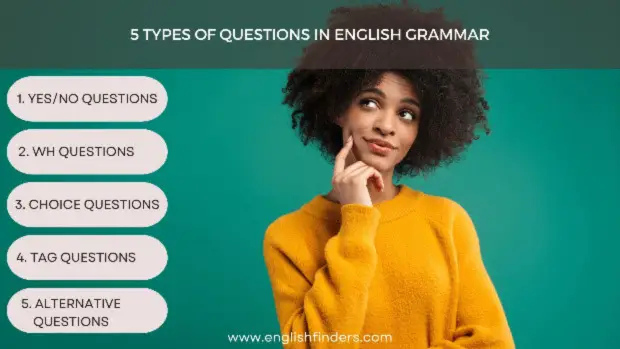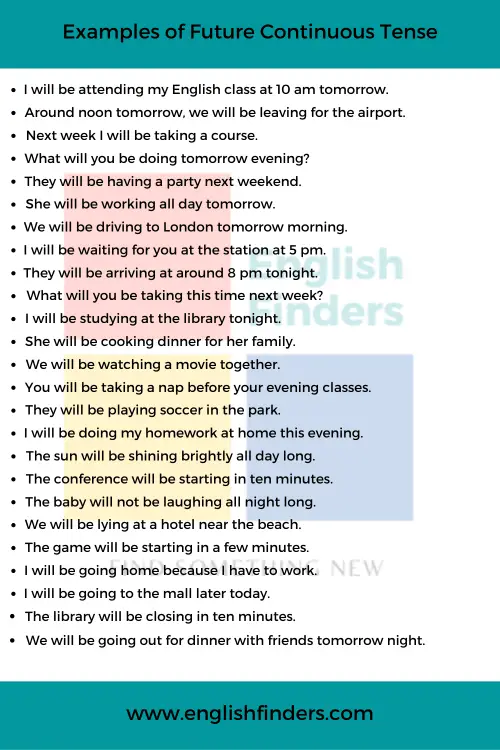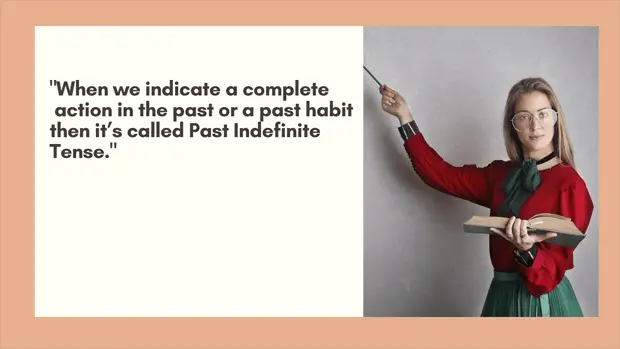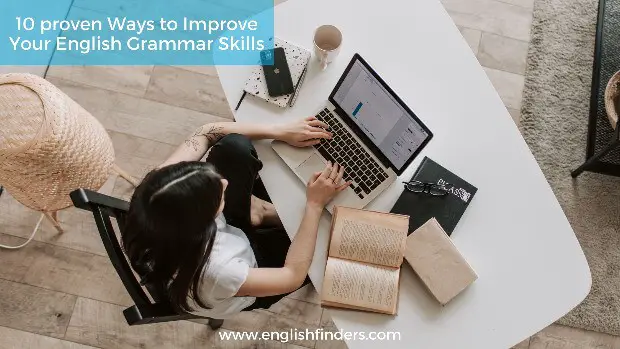Last updated on May 26th, 2025 at 09:58 pm
Asking questions is a key part of communication because it helps us gather information, start conversations, and express curiosity. There are five types of questions in English grammar, each serving a different purpose.
They let us express our interest, clarify confusion, and seek knowledge. In this article, we’ll introduce you to the five main types of questions in English grammar.
5 Types of Questions in English
Quick Navigation
Now, it’s time to explore the 5 types of questions in English grammar.
1. Yes/No Questions
The Yes/No question will be the first question type we examine. These types of questions are essential to daily conversations because they only require a simple “yes” or “no” answer.
In terms of structure, Yes/No questions typically start with an auxiliary verb (e.g., “do,” “does,” “did,” “is,” “are,” “am,” “will,” etc.) followed by the subject and the main verb.
For example, “Do you like chocolate?”, “Is she coming to the party?”. These questions are excellent for getting confirmation, asking opinions, or learning basic concepts.
Let us see some common Yes/No Questions with answers:
- Is it raining outside? – Yes, it is raining.
- Did you finish your homework? – No, I didn’t finish it yet.
- Are you going to the movies tonight – Yes, I am going to the movies.
- Do you like seafood? – Yes, I love seafood.
- Is she your sister? – No, she is my cousin.
- Did they arrive on time? – Yes, they arrived early.
- Are you feeling tired? – Yes, I am feeling exhausted.
- Did you enjoy the concert? – Yes, I had a great time.
- Is the book on the shelf? – No, it’s on the table.
- Do you have any siblings? – Yes, I have one brother.
2. Wh Questions
Let’s now explore the Wh-questions. These questions are essential in English grammar, which allows us to obtain specific information and engage in deeper conversations.
Wh-questions usually start with a question or word like “who,” “what,” “where,” “when,” “why,” or “how.” They are made to seek information about different aspects of a situation, an event, or a person.
The structure of Wh- questions involves placing the question word at the beginning, followed by the auxiliary verb (if necessary), the subject, and the main verb.
For instance, “What did you eat for breakfast?” or “Where is the nearest library?” Wh- questions open up a world of possibilities for gathering details, clarifying uncertainties, and exploring different perspectives.
Let us see some common WH Questions with answers:
- Who is your favorite author? – My favorite author is J.K. Rowling.
- What time does the concert start? – The concert starts at 7:00 PM.
- Where did you go on your last vacation? – I went to Hawaii on my last vacation.
- When is your birthday? – My birthday is on March 15th.
- Why did you choose to study engineering? – I chose to study engineering because I have always been interested in problem-solving and technology.
- How did you learn to play the guitar? – I learned to play the guitar by taking lessons from a music teacher.
- Who is your best friend? – My best friend’s name is Sarah.
- What is your favorite movie? – My favorite movie is “The Shawshank Redemption.”
- Where can I find a good restaurant nearby? – A great restaurant called “The Olive Tree” is just a few blocks away.
- When did you start learning French? – I started learning French two years ago in high school.
3. Choice Questions
Now let us know about the choice questions. In English grammar, choice questions are a special type of question that gives the respondent options or alternatives. They are intended to gather information regarding preferences, choices, or options.
Choice questions often start with phrases such as “Would you prefer,” “Do you want,” or “Which one.” The structure of choice questions involves presenting two or more options, followed by the auxiliary verb and the subject.
For example, “Would you prefer tea or coffee?” or “Do you want a blue or red shirt?”. Choice questions give us a clear, concise way to quickly assess someone’s preferences, make decisions, or explore different possibilities.
Let us see some common Choice Questions with answers:
- Would you like to have dinner at a restaurant or cook at home? – I would prefer to cook at home.
- Do you want to watch a movie or go for a walk? – Let’s go for a walk.
- Which color do you prefer, blue or green? – I prefer the color blue.
- Would you rather travel to the beach or go hiking in the mountains? – I would rather travel to the beach.
- Do you want to have a sandwich or a salad for lunch? – I’ll have a salad, please.
- Which movie genre do you enjoy more, action or comedy? – I enjoy comedy movies more.
- Would you like to visit Europe or Asia for your next vacation? – I would love to visit Europe.
- Do you prefer reading fiction or non-fiction books? – I prefer reading fiction books.
- Which day at the spa or amusement park would you choose? – I would choose a day at the spa.
- Would you rather have ice cream or cake for dessert? – I would like to have ice cream for dessert.
4. Tag Questions
The tone and meaning of a sentence can be significantly impacted by tag questions, which are a special and versatile aspect of English grammar. These questions are formed by introducing a brief question fragment at the end of a sentence, which frequently consists of an auxiliary verb and a pronoun. Tag questions are used to request agreement, indicate doubt, or request confirmation.
The structure of tag questions involves using the opposite form of the main verb in the statement and matching it with the appropriate auxiliary verb. For example, “You don’t mind, do you?” or “She’s coming with us, isn’t she?”.
Tag questions allow us to have interactive discussions, promote participation, and seek validation from others. They make our language more complicated and nuanced, which makes it more vibrant and engaging.
Let us see some common Tag Questions with answers:
- You finished your assignment, didn’t you? – Yes, I did.
- They won’t be late, will they? – No, they won’t.
- He’s a great singer, isn’t he? – Yes, he is.
- We should take the bus, shouldn’t we? – Yes, we should.
- You’ve been to Paris before, haven’t you? – No, I haven’t.
- She doesn’t like coffee, does she? – No, she doesn’t.
- It’s a beautiful day, isn’t it? – Yes, it is.
- He can speak Spanish fluently, can’t he? – Yes, he can.
- They shouldn’t be here, should they? – No, they shouldn’t.
- You’re coming to the party, aren’t you? – Yes, I am.
5. Alternative Questions
Alternative questions, usually referred to as “or” questions, provide the respondent with a range of choices. They are effective grammar tools that allow us to ask clear-cut and brief questions regarding preferences, decisions, or possibilities. Alternative questions are formed by presenting two or more options connected by the conjunction “or.”
The structure of alternative questions involves placing the options after the auxiliary verb or modal verb. For instance, “Would you like tea or coffee?” or “Do you prefer to go by car or train?”
We can explore different possibilities, seek specific choices, or determine someone’s preferences by using alternative questions. You can improve your capacity to communicate clearly and express your preferences by becoming an expert at alternative questions.
Let us see some common Alternative Questions with answers:
- Would you like to go to the beach or stay home and relax? – I would like to go to the beach.
- Do you prefer cats or dogs as pets? – I prefer dogs as pets.
- Should we watch a movie or go for a hike this weekend? – Let’s go for a hike this weekend.
- Would you rather have biryani or kacchi for lunch? – I would rather have biryani for lunch.
- Do you want to visit London or Paris for your next vacation?– I want to visit Paris for my next vacation.
- Should we have the meeting in the morning or the afternoon? – Let’s have the meeting in the morning.
- Would you like to study Spanish or French as a second language? – I would like to study French as a second language.
- Do you prefer action movies or romantic comedies? – I prefer action movies.
- Should we take the bus or walk to the museum? – Let’s take the bus to the museum.
- Would you rather have a cup of tea or a glass of orange juice? – I would rather have a cup of tea.
Summary
Asking the right type of question is an important skill in English communication. In this article, we explored the five types of questions in English grammar:
- Yes/No Questions – Simple questions that can be answered with “yes” or “no.”
- WH-Questions – Questions that start with who, what, where, when, why, or how to get specific information.
- Choice Questions – Questions that give options to choose from, using “or.”
- Tag Questions – Short questions added to statements to confirm information or seek agreement.
- Alternative Questions – Polite ways of asking questions regarding preferences, decisions, or possibilities.
FAQs
What are the five types of questions in English grammar?
The five types of questions in English grammar are Yes/No questions, Wh- questions, Choice questions, Tag questions, and Alternative questions.
How do I form a Yes/No question?
A Yes/No question is formed by starting with an auxiliary verb (or the verb “be”) followed by the subject and the main verb. For example, “Do you like chocolate?” or “Is she coming to the party?”
What are Wh- questions, and how do I construct them?
Wh- questions are used to inquire about specific information and start with question words such as “who,” “what,” “where,” “when,” “why,” and “how.” The structure involves placing the question word at the beginning, followed by the auxiliary verb (if necessary), the subject, and the main verb. For example, “What did you eat for breakfast?” or “Where is the nearest library?”
How are Choice questions different from other types of questions?
Choice questions provide options or alternatives for the respondent to choose from. They typically start with phrases like “Would you prefer,” “Do you want,” or “Which one.” The structure involves presenting the options, followed by the auxiliary verb and the subject. For instance, “Would you like tea or coffee?” or “Do you want the blue shirt or the red one?”
What are Tag questions, and how do they work?
Tag questions are used to seek confirmation, agreement, or express doubt. They are formed by adding a short question fragment at the end of a statement. The structure involves using the opposite form of the main verb in the statement and matching it with the appropriate auxiliary verb. For example, “You finished your assignment, didn’t you?” or “She’s coming with us, isn’t she?”
5 Types of Questions Exercises
Quiz 1: Yes/No Questions
- _______ you enjoy reading books?
- _______ they coming to the party tonight?
- _______ she play the piano?
- _______ we go to the beach tomorrow?
- _______ he speak Spanish fluently?
Quiz 2: Wh Questions
- _______ is your favorite color?
- _______ did you go on your last vacation?
- _______ time does the movie start?
- _______ are you feeling today?
- _______ did you meet at the party?
Quiz 3: Choice Questions
- _______ you like coffee or tea?
- _______ prefer cats or dogs?
- _______ movie genre do you enjoy more, action or comedy?
- _______ should we have for dinner, pizza or pasta?
- _______ you rather go for a walk or watch a movie?
Quiz 4: Tag Questions
- He is a doctor, _______?
- You haven’t seen the movie, _______?
- We should leave now, _______?
- She can swim, _______?
- It’s a beautiful day, _______?
Quiz 5: Alternative Questions
- _______ you like chocolate or vanilla ice cream?
- _______ prefer to travel by plane or train?
- _______ you rather read a book or watch a movie?
- _______ should we visit, London or Paris?
- _______ you want to have for lunch, sandwich or salad?

Azizul Hakim is the founder & CEO of englishfinders.com. He is a passionate writer, English instructor, and content creator. He has completed his graduation and post-graduation in English language and literature.




